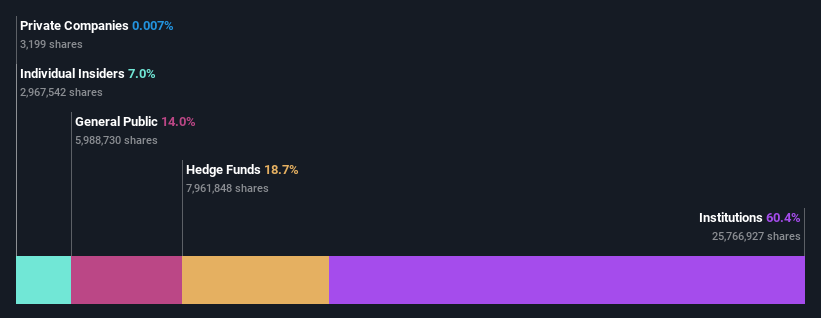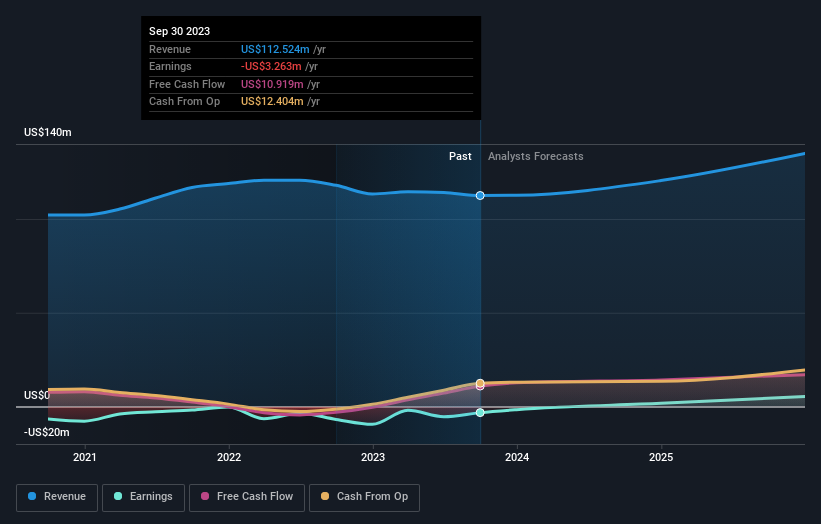With 60% ownership, Harvard Bioscience, Inc. (NASDAQ:HBIO) boasts of strong institutional backing
Key Insights
Significantly high institutional ownership implies Harvard Bioscience's stock price is sensitive to their trading actions
A total of 10 investors have a majority stake in the company with 52% ownership
Ownership research, combined with past performance data can help provide a good understanding of opportunities in a stock
Every investor in Harvard Bioscience, Inc. (NASDAQ:HBIO) should be aware of the most powerful shareholder groups. And the group that holds the biggest piece of the pie are institutions with 60% ownership. That is, the group stands to benefit the most if the stock rises (or lose the most if there is a downturn).
Since institutional have access to huge amounts of capital, their market moves tend to receive a lot of scrutiny by retail or individual investors. Hence, having a considerable amount of institutional money invested in a company is often regarded as a desirable trait.
Let's delve deeper into each type of owner of Harvard Bioscience, beginning with the chart below.
View our latest analysis for Harvard Bioscience
What Does The Institutional Ownership Tell Us About Harvard Bioscience?
Institutional investors commonly compare their own returns to the returns of a commonly followed index. So they generally do consider buying larger companies that are included in the relevant benchmark index.
We can see that Harvard Bioscience does have institutional investors; and they hold a good portion of the company's stock. This implies the analysts working for those institutions have looked at the stock and they like it. But just like anyone else, they could be wrong. If multiple institutions change their view on a stock at the same time, you could see the share price drop fast. It's therefore worth looking at Harvard Bioscience's earnings history below. Of course, the future is what really matters.
Institutional investors own over 50% of the company, so together than can probably strongly influence board decisions. Our data indicates that hedge funds own 19% of Harvard Bioscience. That catches my attention because hedge funds sometimes try to influence management, or bring about changes that will create near term value for shareholders. Looking at our data, we can see that the largest shareholder is B. Riley Asset Management LLC with 7.6% of shares outstanding. In comparison, the second and third largest shareholders hold about 6.8% and 6.4% of the stock. In addition, we found that James Green, the CEO has 3.8% of the shares allocated to their name.
We did some more digging and found that 10 of the top shareholders account for roughly 52% of the register, implying that along with larger shareholders, there are a few smaller shareholders, thereby balancing out each others interests somewhat.
While it makes sense to study institutional ownership data for a company, it also makes sense to study analyst sentiments to know which way the wind is blowing. There is some analyst coverage of the stock, but it could still become more well known, with time.
Insider Ownership Of Harvard Bioscience
The definition of an insider can differ slightly between different countries, but members of the board of directors always count. The company management answer to the board and the latter should represent the interests of shareholders. Notably, sometimes top-level managers are on the board themselves.
I generally consider insider ownership to be a good thing. However, on some occasions it makes it more difficult for other shareholders to hold the board accountable for decisions.
We can see that insiders own shares in Harvard Bioscience, Inc.. In their own names, insiders own US$13m worth of stock in the US$183m company. Some would say this shows alignment of interests between shareholders and the board, though we generally prefer to see bigger insider holdings. But it might be worth checking if those insiders have been selling.
General Public Ownership
With a 14% ownership, the general public, mostly comprising of individual investors, have some degree of sway over Harvard Bioscience. While this size of ownership may not be enough to sway a policy decision in their favour, they can still make a collective impact on company policies.
Next Steps:
I find it very interesting to look at who exactly owns a company. But to truly gain insight, we need to consider other information, too. Case in point: We've spotted 1 warning sign for Harvard Bioscience you should be aware of.
Ultimately the future is most important. You can access this free report on analyst forecasts for the company.
NB: Figures in this article are calculated using data from the last twelve months, which refer to the 12-month period ending on the last date of the month the financial statement is dated. This may not be consistent with full year annual report figures.
Have feedback on this article? Concerned about the content? Get in touch with us directly. Alternatively, email editorial-team (at) simplywallst.com.
This article by Simply Wall St is general in nature. We provide commentary based on historical data and analyst forecasts only using an unbiased methodology and our articles are not intended to be financial advice. It does not constitute a recommendation to buy or sell any stock, and does not take account of your objectives, or your financial situation. We aim to bring you long-term focused analysis driven by fundamental data. Note that our analysis may not factor in the latest price-sensitive company announcements or qualitative material. Simply Wall St has no position in any stocks mentioned.


